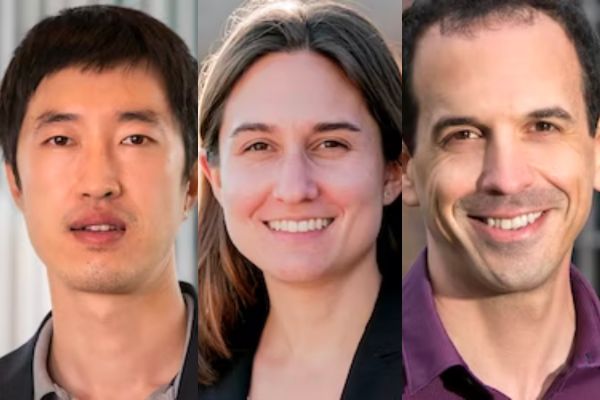Bae, Ditto, Raviv win $25,000 Collaboration Initiation Grants
The one-year awards promote collaborative research within the university

Sang-Hoon Bae, Jenna Ditto and Netanel Raviv, all assistant professors in the McKelvey School of Engineering, have been awarded $25,000 Collaboration Initiation Grants from the school.
The program awards one-year grants to projects that facilitate collaborative research within McKelvey Engineering departments and other university departments for tenure-track faculty. The grants are a pathway for faculty to apply for larger interdisciplinary grants, to create a more synergistic project than could be achieved by one researcher in one discipline, and to demonstrate the potential to sustain the collaboration and obtain external funding. Each awardee receives $20,000 from the school and must have $5,000 in cost-sharing from their department or collaborators.
Bae, assistant professor of mechanical engineering & materials science, is collaborating with Lan Yang, the Edwin H. & Florence G. Skinner Professor in the Preston M. Green Department of Electrical & Systems Engineering. They will work to develop a photonic van der Waals (vdW) integration as a new strategy to circumvent the limits in heteroepitaxy, or when a film of different composition or crystal structure than the substrate is grown. They plan to use optical thin films onto optimal substrates, lift them off with vdW interfaces, and transfer them to photonic templates. Their method would allow them to integrate multiple dissimilar materials with distinct parameters on the same photonic chip, which has not previously been possible with conventional approaches. They expect that this low-energy, approach also would create novel hetero-integrated photonic layouts to explore innovative nanophotonic polaritonic phenomena in artificially constructed 2D and 3D hybrid heterostructures. The innovative concept of photonic vdW structures is introduced in their recent collaborative paper published in Nature Review Materials.
Ditto, assistant professor of energy, environmental & chemical engineering, will collaborate with Andrew Kau, assistant professor of medicine in the School of Medicine, to analyze organic compounds within house dust and study their impacts on the respiratory system. In their study, Ditto and Kau will investigate the partitioning of chemical components of motor vehicle emissions to indoor dust and the diverse chemical transformation products formed from dust-bound species upon exposure to reactive gases in indoor air. In addition, they will assess the oxidative potential of these chemical reaction products and will evaluate changes in the markers of allergic asthma upon exposure to dust containing fresh vs. chemically aged motor vehicle emissions in a preclinical model. Ditto’s award is equally funded by the McKelvey School of Engineering and the Institute of Clinical and Translational Sciences at the School of Medicine.
Raviv, assistant professor of computer science & engineering, will collaborate with Bruno Sinopoli, the Das Family Distinguished Professor and chair of the Preston M. Green Department of Electrical & Systems Engineering. Together, they will address the “curse of dimensionality” in data science, in which the size of datasets is too large for computations to be done efficiently or accurately, using recent developments in Fourier analysis. They will develop mathematical techniques for detecting and removing intricate dependencies in datasets in order to store, analyze or visualize more efficiently. These techniques are essential to improve the runtime of learning algorithms and are used in every branch of science in which large-scale data analysis is required. With their co-advised student, the team will develop new methods, test their applicability on real-world datasets and study further applications in signal-processing and privacy.
Ditto and Kau’s grant is supported by the Washington University Institute of Clinical and Translational Sciences grant UL1TR002345 from the National Center for Advancing Translational Sciences (NCATS) of the National Institutes of Health (NIH). The content is solely the responsibility of the authors and does not necessarily represent the official view of the NIH.
Click on the topics below for more stories in those areas
- Women & Engineering
- Research
- Energy, Environmental & Chemical Engineering
- Computer Science & Engineering
- Mechanical Engineering & Materials Science






